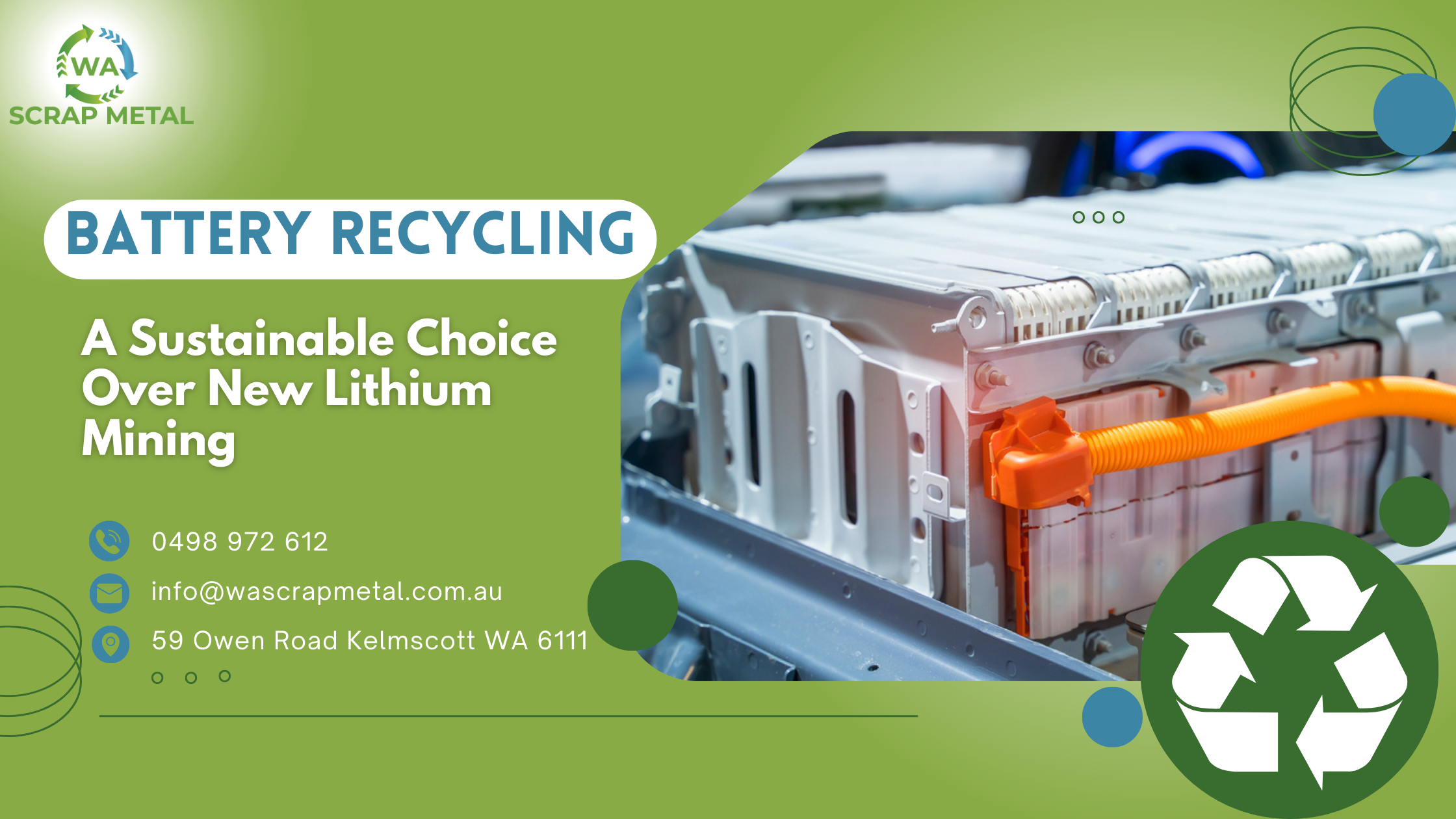Lithium Battery Recycling: Sustainable Choice Than Conventional Batteries in Mining
In today’s evolving mining industries, the global shift towards sustainability practices has become the main concern. The mining industries stand at a critical moment where assessing the environmental impact of their mining operations, they are actively seeking innovative solutions to minimize harm.
So, this shift towards eco-friendly practices is bringing a debate between lithium batteries and conventional battery solutions, being used as electric mining equipment in mining.
And we are here to clarify this debate for you!
In this blog, we’ll shed light on the contrasting aspects of lithium and conventional battery solutions in mining operations. Additionally, we’ll discuss lithium battery recycling as a more sustainable option than mining, highlighting its environmental, economic, and social impacts.
So, let’s explore sustainability, discovering the advantages, opportunities and challenges presented by this battery technology!
Lithium Batteries vs. Conventional Battery (Lead-Acid Batteries)
Lithium batteries and conventional lead-acid batteries are like two sides of the same coin in the world of energy storage.
-
Lithium Batteries:
These batteries have a longer lifespan, lighter weight, and higher energy density compared to conventional batteries. They are also more environmentally friendly during use, emitting fewer greenhouse gases.
-
Conventional Batteries:
These conventional batteries have been around for a long time. They are heavier, bulkier, and have a shorter lifespan compared to lithium batteries. Lead-acid batteries also require more maintenance and are less energy-efficient.
Contrasting Lithium Batteries with Conventional Battery Solutions in Mining
Lithium batteries have gained popularity in the mining industry because of their longer lifespan, lighter weight, and higher energy efficiency compared to conventional batteries like lead-acid ones. The mining industry embraces lithium batteries as they require less maintenance, reducing downtime and costs for mining operations. Additionally, lithium batteries contribute to lower emissions, aligning with sustainability goals.
Conversely, conventional batteries often lead to resource depletion and environmental degradation due to increased mining activities. Their disposal can also pose risks to the environment.
Thus, mining companies are willing to make a big change – switching to electric mining equipment that runs on lithium batteries. This switch is a bright spot in the efforts to be kinder to the planet.
The Popularity of Lithium Batteries in Mining
Lately, big mining names like Tinto, Rio, FMG, and BHP have been going electric, using lithium batteries to power their latest mining machines. This move away from old-school fossil fuel machines is a big step towards cleaner, greener mining methods.
Their longer lifespan, energy efficiency, and reduced environmental impact have made them a preferred choice for companies aiming to adopt more eco-friendly practices – reducing carbon emissions.
Advantages of Lithium Batteries in Mining:
1. Energy Efficiency:
Lithium batteries excel in energy efficiency, offering higher power output in a compact size. This efficiency results in decreased energy consumption and lower costs for mining operations.
2. Lower Maintenance:
Compared to older battery technologies, lithium batteries require minimal maintenance. This means less downtime for mining equipment, leading to improved productivity and operational efficiency.
3. Reduced Carbon Emissions:
Lithium batteries contribute to lower greenhouse gas emissions, aligning with global sustainability goals and regulatory requirements.
4. Durability and Longevity:
One of the standout features of lithium batteries is their durability and long lifespan. They outlast traditional batteries, reducing the frequency of replacements and minimizing waste generation.
5. Environmental Benefits:
Lithium batteries have a lower environmental impact, emitting fewer pollutants and being easier to recycle. Their advancing eco-friendly practices nature align well with sustainability goals in the mining industry and contribute to a cleaner environment.
6. Integration with Renewable Energy:
The compatibility with renewable energy sources of lithium batteries makes them ideal for mining operations, aiming to reduce reliance on fossil fuels. They enable the integration of solar or wind power, further enhancing sustainability initiatives.
However, the sustainability journey doesn’t end with the operational phase of these batteries. The end-of-life stage brings forth significant challenges and opportunities, particularly concerning recycling and disposal.
Battery Recycling | Challenges and Opportunities
When mining industries start using lithium batteries, they have to think about what happens to these batteries once they’re no longer usable. Unlike regular batteries, lithium ones need special recycling to get back valuable stuff like lithium, cobalt, and nickel.
The hard part is finding ways to recycle them well without messing up the environment and still getting back as much useful stuff as possible.
On the other hand, conventional batteries already have good recycling systems in place. People have been recycling them for a while because it’s required by rules, and they can get back valuable materials like lead through recycling. But these batteries also bring their problems, like if they aren’t handled right, they can let out lead and sulfuric acid, which isn’t good for the environment.
Lithium Battery Recycling Over Mining | Sustainability Practices
The demand for lithium-ion batteries (LIBs) has skyrocketed across industries like electronics, renewable energy, and electric vehicles, highlighting the need for sustainable solutions.
The disposal of worn-out LIBs has sparked concerns about their impact on the environment and the sustainability of manufacturing processes. To address these challenges, battery recycling has emerged as a viable solution, offering both environmental protection and advancements in manufacturing sustainability.
Unlike traditional recycling methods involving high-temperature smelting and acid-leaching, direct recycling has gained popularity due to its cost-effectiveness and environmental advantages.
Recycling lithium batteries is not only beneficial for the environment but also aligns with the mining industry’s broader sustainability goals. It promotes the reuse of valuable materials, reduces waste, and encourages the development of innovative recycling technologies. As mining companies invest in recycling businesses, they pave the way for a more environmentally conscious and profitable future.
Let’s see how the recycling process differs from conventional mining practices and why embracing battery recycling is crucial for sustainable practices in the mining industry.
Advantages of Lithium Battery Recycling:
- Resource Recovery: Recycling lithium batteries enables the recovery of valuable materials like lithium, cobalt, and nickel, reducing the need for virgin mining and preserving natural resources.
- Environmental Impact: Proper recycling reduces environmental pollution and minimizes the ecological footprint associated with extracting raw materials for battery production.
- Circular Economy: Embracing battery recycling promotes a circular economy model, where materials are reused and recycled, contributing to long-term sustainability and waste reduction.
- Regulatory Compliance: Many regions are implementing regulations that mandate battery recycling, driving industry-wide efforts towards sustainable practices.
Conclusion: Embracing Sustainable Solutions
To sum up, the contrast between lithium battery recycling and conventional battery solutions in mining underscores the importance of embracing sustainable practices. While lithium batteries boast immediate environmental advantages, their true sustainability lies in efficient recycling and resource recovery.
By prioritizing battery recycling, mining industries can reduce environmental harm, conserve resources, and contribute to a greener future. Embracing sustainability practices isn’t just a choice; it’s a necessity for a strong and thriving planet.
Contact WA Scrap Metal for Eco-friendly Battery Recycling Now!
At WA Scrap Metal, we specialise in recycling and disposing of lead-acid batteries safely to avoid biohazard risks and environmental impact.
Our convenient battery pickup, recycling, and secure disposal services ensure a safe and eco-friendly solution for old batteries.
Call us at 0498 972 612 to schedule a pickup.


